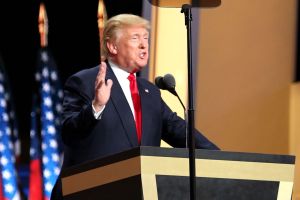Although Donald Trump is the clear frontrunner for Republicans, the Chicago Council Survey finds that some key issues are still a challenge for those who supported another candidate.
As the Republican National Convention gets underway in Cleveland, the party's top goal will be to unite Republicans and expand Donald Trump’s appeal to the general electorate. A new survey by the Chicago Council on Global Affairs, conducted June 10-27, 2016, found that a large majority of Republicans are now getting behind the GOP nominee. At the same time, there are some clear contrasts between the core supporters of Donald Trump and those who wanted another candidate to win the party's nomination. These differences will pose a challenge to the party leadership, and the challenge will be even greater when attempting to bridge divides with the broader public.
The first day of the convention will draw on the theme “Make America Safe Again,” with a focus on national security and immigration. Subsequent themes include “Make America Work Again” and “Make America First Again,” emphasizing trade and jobs. This analysis highlights some key differences within the Republican electorate on each of these topics.
Trump Support: From a committed minority to an eventual majority
If the general election were held today, a solid majority of Republicans (including self-described Republicans and Republican-leaning Independents) say they would vote for Mr. Trump (83%) in the presidential contest against Secretary Clinton (13%). But Donald Trump was not the top choice for many Republicans among the full field of primary candidates. While a committed minority of 31 percent say that Donald Trump is their “top choice for president,” two in three (65%) name a different candidate. While eventually deciding to back Trump, those who were hoping for a different nominee are not endorsing some of Trump’s key positions.
National Security
When it comes to national security, Republicans—and a majority of Americans across political affiliations—express a heightened sense of threat from terrorism after the Orlando shootings and think that a wide range of actions are effective in combating terrorism. Core Trump supporters (the 31 percent who name Trump as top choice among the field of primary candidates) differ on some key approaches.
- Mr. Trump’s core supporters are more likely to believe that limiting the flow of refugees and migrants is effective at countering terrorism (86% vs. 74% among other Republicans). They are also more likely to say that using torture is effective (73% vs. 60% among other Republicans).
- Core Trump supporters are somewhat less likely than Republicans who supported a non-Trump candidate to say that maintaining existing alliances is a very effective way to achieve US foreign policy goals (34% vs. 42%). Similarly, only four in ten core Trump supporters (44%) say that NATO is essential to US security, while a majority among those who backed other candidates (61%) say it is essential.
- By very narrow majorities, Republicans supporting both Trump and non-Trump candidates say the country is less safe now than before the terrorist attacks of September 11, 2001 (54% and 51% respectively).
National Security Views
Diverging national security views among Republicans and Republican-leaning Independents.
On the home front, there are no differences between Republicans supporting Trump or a non-Trump candidate on personal concerns about gun violence in the United States.
- In contrast to Democrats, who personally worry about being a target of gun violence more than a target of a terrorist attack (61% vs. 41% among self-described Democrats and Democratic-leaning Independents), Republicans are no more concerned about one possibility over the other (46% gun violence, 50% terrorist attack).
- Just over half of both Trump supporters (54%) versus other candidate supporters (52%) say that the greater terrorist threat to the United States comes from people inside versus outside the country.
Immigration
Core Trump supporters favor policy stances that align with Mr. Trump’s positions on immigration. While the Republican public overall is much more concerned than Democrats and Democratic-leaning Independents about this issue, core Trump supporters express an even greater sense of threat and even less favorability towards immigrants:
- Seven in ten (69%) say that legal immigration should be decreased, compared to 45 percent among Republicans who supported a different candidate.
- Core Trump supporters are nearly 20 percentage points less likely than other Republicans to express a favorable view of Middle Eastern (15% Trump vs. 38% non-Trump) and Mexican immigrants (35% Trump vs. 53% non-Trump) currently living in the United States.
- Almost nine in ten (86%) say that immigrants and refugees coming into the US are a critical threat, compared to 56 percent of those Republicans who supported a non-Trump candidate.
- Core Trump supporters are more likely to favor a wall expanding the 700 miles of border wall and fencing with Mexico to reduce illegal immigration into the United States (93%) versus a smaller majority of other Republicans (72%).
Immigration Views
Diverging immigration views among Republicans and Republican-leaning Independents.
Trade and Globalization
Core Trump supporters also share the candidate’s anti-globalization and anti-trade dispositions.
- They are considerably less likely than Republicans who supported a non-Trump candidate to say that international trade is good for the US economy (40% core Trump vs. 57% other candidate), consumers like them (54% vs. 73%), and their own standard of living (49% vs. 65%).
- Only half (50%) say that globalization is mostly good for the United States, compared to 62 percent of those that supported other candidates.
- Only half (47%) support the Trans-Pacific Partnership trade agreement, while a majority of those who supported other candidates (58%) favor signing the deal.
- While protecting American jobs is a top priority for Americans, it ranks highest among core Trump supporters (86% say it is very important, compared to 72% of Republicans who supported other candidates).
Economic Views
Diverging economic views among Republicans and Republican-leaning Independents.
There are also areas of agreement between the committed Trump supporters and Republicans that would prefer another candidate, such as the top security threats and priorities for the country, the primacy of economic strength, and support for the US military presence around the world (details to come in forthcoming reports). But core Trump supporters’ emphatic views on immigration, trade, and security alliances may run counter to the party faithful’s expectations for GOP leadership.
Methodology
The analysis in this report is based on data from the 2016 Chicago Council Survey of the American public on foreign policy. The 2016 Chicago Council Survey was conducted by GfK Custom Research using their large-scale, nationwide online research panel between June 10-27, 2016 among a national sample of 2,061 adults, 18 years of age or older, living in all 50 US states and the District of Columbia. The overall margin of error ranges ±2.2 to ±3.5 percentage points, depending on the specific question. For the analysis among Republicans included here, the margin of error ranges from ±7.9 to ±11.2 percentage points, again varying depending on the specific question.
Unless specified otherwise, references to Republicans in this report refer to those who self-identified as Republican and those who self-identified as an Independent that is “closer to the Republican party.”
Respondents were asked two separate questions about voting preferences. The first asked “If the presidential election were being held today and the candidates were Hillary Clinton, the Democrat or Donald Trump, the Republican, for whom would you vote? The response categories were randomized. The second question, which we used to calculate “core Trump voters,” asked “Regardless of your voting preference in the previous question, who was your top choice for president among the following candidates – Hillary Clinton, Donald Trump, Bernie Sanders, Ted Cruz, John Kasich, Marco Rubio, Jeb Bush, or other (specify)?” These response options were also randomized.
The 2016 Chicago Council Survey is made possible by the generous support of the John D. and Catherine T. MacArthur Foundation, the Korea Foundation, and the personal support of Lester Crown and the Crown family.






